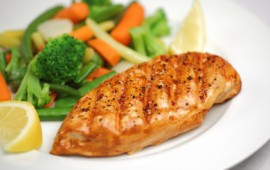What is the Paleo Diet?
Author: Shannon Miller Lifestyle

Paleo has been growing in popularity lately.
So, you may be wondering, “What is Paleo?” and “Why could it be for me?”
The paleo diet is based on the idea that one eats like our ancestors once did. The idea is that you will eat things that were hunted or gathered: meat, fish, and plants. It emphasizes general wellness and is not as concerned with the typical calorie counting types of diets. It is great for athletes, pregnant and nursing mothers(particularly if baby is experiencing tummy problems), and anyone experiencing bowel problems. It emphasizes whole and unprocessed foods. Focusing on organic or grass fed meats and organic fruits and vegetables as much as possible.
To break it down just a little more:
What you SHOULD eat:
Fish
Meat
Eggs
Nuts
Fruits
Vegetables
What you SHOULD NOT eat:
Dairy
Grains
Legumes
Excess Sugars
Vegetable Oils
One main goal is that your diet is gluten-free and dairy-free.
Gluten and dairy are both difficult for the body to digest. About 1% of the population has celiac disease where it makes it impossible for their body to digest gluten and they become ill when they do happen to eat something with gluten in it. Another 29% of the healthy population have a gluten sensitivity that is detected by anti-gliadin IgA in stool tests. Lactose is also difficult to digest. Approximately 40 million Americans are lactose intolerant. 3 out of 4 adults have a decrease in lactase activity, the enzyme that digest lactose. (Source: National Digestive Diseases Information, USA Today) If you are concerned about calcium, be sure to include leafy greens like spinach or kale.
Trying Paleo eating for a short period of time, like a 30 day challenge, may be something you want to try if you feel you are suffering from these or other undiagnosed digestive problems.
Some other health benefits of a paleo diet may include:
- Reduce your risk of heart disease, type 2 diabetes, and most chronic degenerative diseases that affect people in the western world
- Lose weight if you are overweight
- Improve your athletic performance
- Slow or reverse progression of an autoimmune disease
- Improve or eliminate acne
- Sleep better and have more energy throughout the day
- Enjoy an increased libido
- Improve your mental outlook and clarity
- Enjoy a longer, healthier, more active life
Paleo eating does not have to be difficult!
The paleo diet can allow for some flexibility which means it can easily adapt to your lifestyle. If you choose to cook with butter instead of coconut or olive oil, you can do that. If you like to include some starches or beans from time to time, you can also do that. It is recommended that up to 3 meals each week can be non paleo if you so choose.
A periodic table of paleo food staples, will give you some ideas as to what to buy when grocery shopping. Nom Nom Paleo, Paleo Parents, and Our Paleo Life have some great resources for Paleo recipes.
